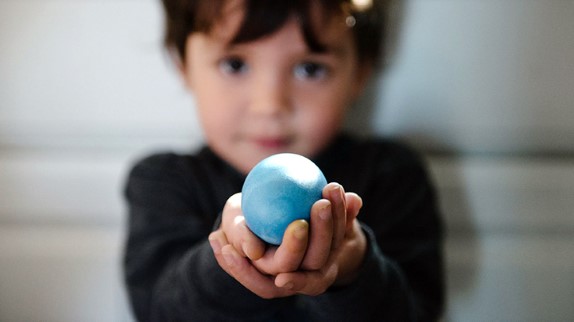In the world according to your tot, what's hers is hers and what's yours is hers as well. Your kiddo not only refuses to let other people use "her" things, she also doesn't hesitate to push her way to the front of any line.
When your toddler claims everything as "Mine!" and demands "Me first!" it's time to start teaching that all-important social skill known as sharing. Here's how and when that sharing spirit will develop.
Why toddlers struggle to share
Your child's perpetual possessiveness and insistence on being first can be annoying, but it doesn't mean she's selfish or greedy. She's just experimenting with the concept of ownership and that, believe it or not, is the first step to learning how to share.
Toddlers have a (very) egotistical view of the world, and ownership is an exciting new concept to them. They now get that things belong to them — but they can't quite grasp that some things don't.
And don't forget about your youngster's burgeoning independence and constant pushing of boundaries. ("Who says I can't have this?!") Refusing to share is just one more way she's testing you and your authority.
When do kids learn to share?
It's no secret that sharing requires caring about another person's feelings, and that's a pretty tall order for a 2-year-old. You can try to help your child share the wealth (or at least, her toys) during toddlerhood, but real sharing and respect for the rights of others won't flower until usually around age 3.[1]
The sharing problems that come along with the all-too-normal "mine-all-mine" phase then start to tail off. With a little practice (and a lot of patience), your little one will someday have no trouble sharing.
Read This Next
How to teach kids to share
Problems sharing can happen on playdates, at day care and whenever your tot's hanging out with others. Until she masters the concept of sharing, use these strategies to help keep things pleasant for all involved and teach her how to be a better playmate.
Explain the concept of "other people's stuff"
A good way to start easing sharing problems is by talking about objects that many children use — like the swings at the playground.
It'll take time, but keep reminding her that some things belong to other people or to everybody and that she can't just take stuff she wants whenever she wants it. Ask her how she would feel if someone grabbed her sandbox shovel or hogged the crayons.
Empathize and compromise
When her possessive instinct kicks in, let your little one know you understand that sometimes it's hard to share. Your kind words will work a whole lot better than shame or threats ever could.
Then offer a sharing plan she can live with: "How about if you play with Elmo for a few minutes and then give Emily a chance?" Expect resistance, but do try again (and again).
Don't force it
Making her share sends the message that her needs aren't as important as other people's and that can make her feel pretty insecure ("Hey, Mom, I thought you were on my side!"). Instead, ask her permission before offering her toy to a playmate.
If she says no, don't push her — just try again periodically until she decides to share.
Boost her self-esteem
Give your toddler plenty of positive attention, and let her make some decisions on her own. Definitely applaud any small steps she does make toward sharing.[2] ("You gave Molly a turn — that was so kind!")
When she does misbehave, criticize her behavior, not her. By helping her feel more secure, you can help curb her hoarding habits.
Respect her favorite possessions
Everyone has a cherished item or two, and it's fine for your child to keep those to herself if you're hosting a playdate. Help your tot identify the toys that she has trouble sharing, and stash them away until her guest departs.
Letting your child have a say about what she won't share may make it easier for her to share her less precious playthings when a pal wants to check them out.
Show her how it's done
The next time your child wants a bite of what you're having or a look at one of your things, use the opportunity to give a sharing lesson: Offer a slice of your apple or a chance to try on your sunglasses. Explain that you're sharing something that's yours because you want to.
You can also play turn-taking games together to drive the sharing message home. Build a block tower by taking turns adding blocks, and point out that lots of things are more fun when people take turns.
Use the timer trick
When it comes to sharing problems, why not let a timer do the dirty work? Set a kitchen timer for five or ten minutes to help your toddler surrender a popular toy during playtime with siblings or friends. Explain that when the bell rings, it's time to switch toys.
It may take a few tries for the idea to sink in, but this tactic should reduce tantrums and tears in the long run.





 Trending On What to Expect
Trending On What to Expect






